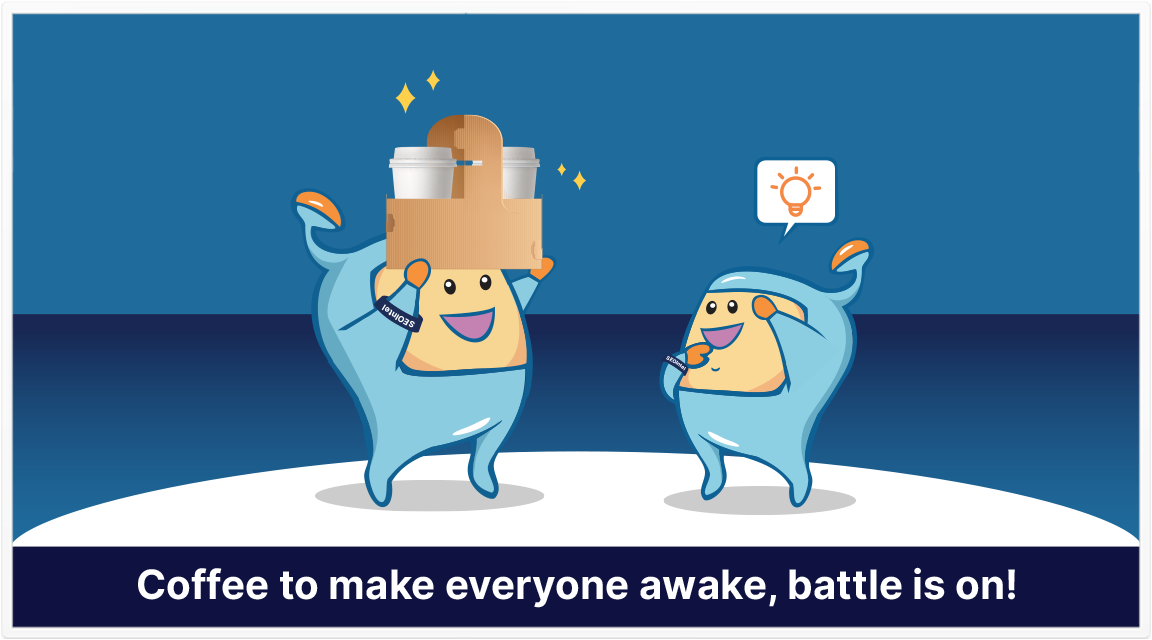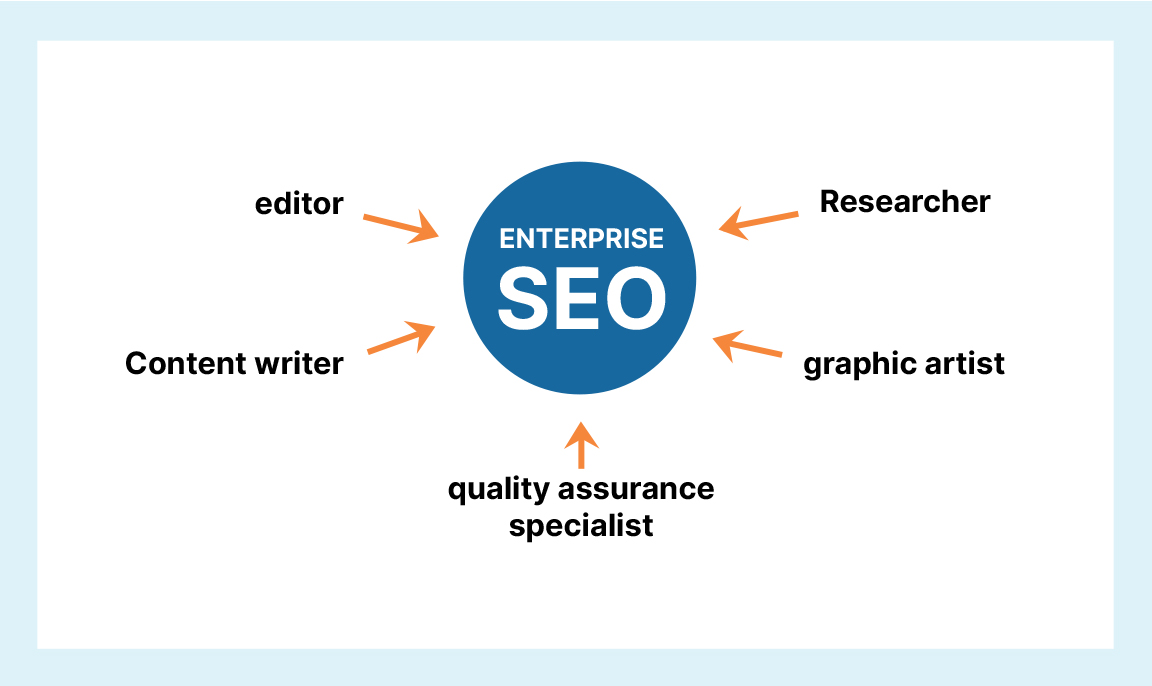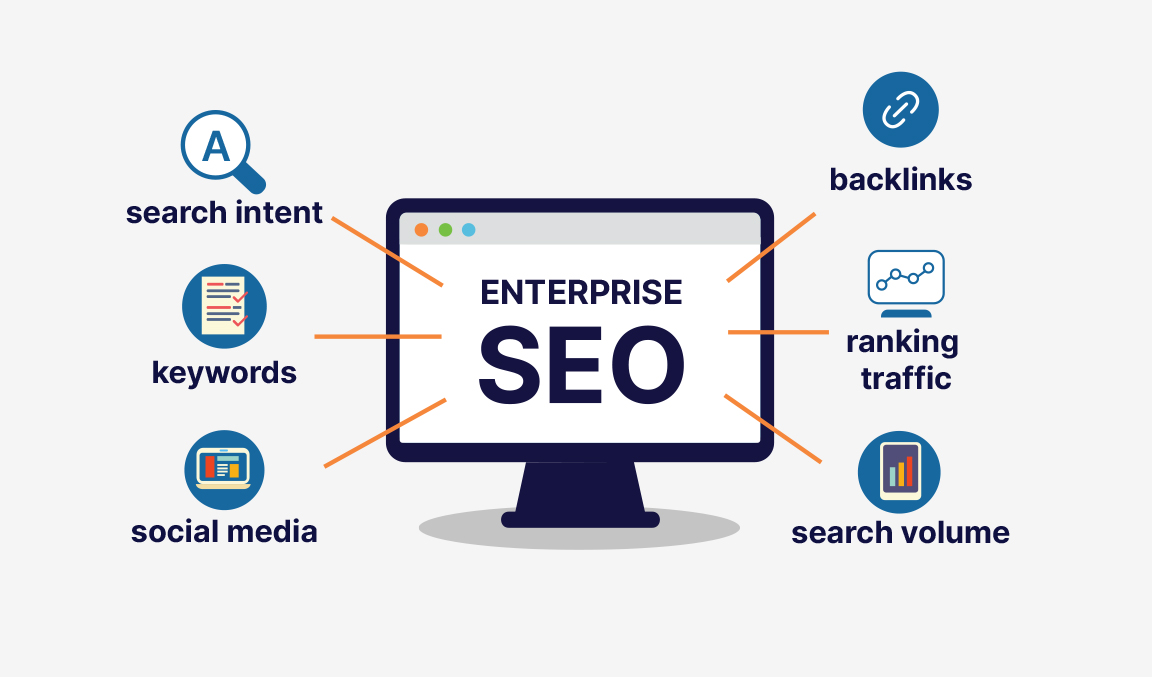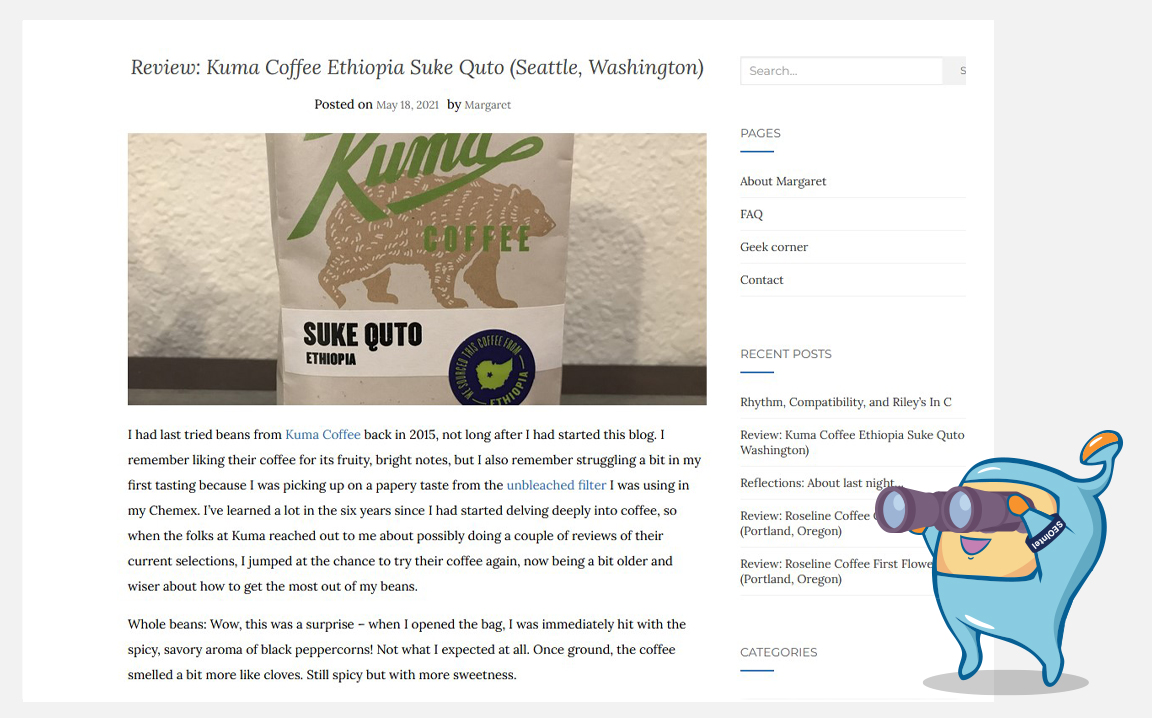Have you ever thought about how larger companies handle their website?
Previously we talked about how to build an SEO Team, today it’s about time to tackle what is Enterprise Search Engine Optimization.
Going back to the first question that has been raised, we all know how tough the competition on the internet is.
When a user makes a search query of a certain place or product the main user intends to buy, there will be a lot of results that will come out from Google and a list of larger websites will eventually top the result.

Simply because businesses are not just merely sitting on their seats and waiting for a customer or clients to visit their website and purchase the product that they sell.
It's the turning point of the birth of search engine optimization (SEO), becoming the reality of internet presence and ranking begins.
As SEO flourished, it helped enterprise companies to maintain their online presence which led to a good conversion rate or sales, but what is Enterprise SEO?
How is it different from other “Normal'' SEOs? Will it help you big time? and What are the Enterprise SEO Strategies?
Here is what you will read in this article:

Enterprise SEO is an approach to SEO which helps in creating a strategy that you or can be used to improve an existing organic search presence of an enterprise level company on Google or the internet in general.
It is said that 50 percent of the larger companies are made of organic traffic, so the remaining traffic will have to be put on a great effort.
We're not just talking about 10 high-quality pages on a website or producing 10 unique pieces of content such as videos, images, blog posts, white papers, and more.
In the case of enterprise companies, they often have hundreds of thousands or even millions of pages with a diverse range of valuable content on their websites.
Given the scale and complexity of managing such a large number of pages, enterprise SEO or an enterprise SEO agency can assist you in creating a strategic plan (known as Enterprise SEO Strategies) to ensure scalability and improve content performance.
They can also help you develop a comprehensive content marketing strategy that aligns with your goals.
Remember that the more you have a high ranking on Google, the SEO concerns become more complicated.
And, who doesn’t want great revenue or a high conversion rate right?
It’s the main reason why you’re here though, and it's every business goal and company goal so let’s dig deeper on this topic.

When we say “normal” or traditional SEO, this is about small businesses or mid-type businesses.
Yes, they still apply SEO but it doesn’t mean that their strategy would work for an enterprise SEO.
Let’s start with the keywords.
The strategic plan for Enterprise SEO provided by an Enterprise SEO Company is specifically designed for large companies, taking into account the competition for keywords.
Smaller businesses often target keywords with lower competition and consider factors such as keyword difficulty and search volume.
They focus on valuable long-tail keywords for optimizing their content.
On the other hand, larger companies are more willing to take risks in their SEO campaigns and compete directly with competitors using short-tail keywords that are highly relevant to their content optimization.
This is possible due to their high domain authority and the fact that they are well-established brands in comparison to smaller-scale businesses.

Remember that enterprise SEO deals with lots of content that needs to be scaled or practice a scalable approach to maintain their ranking.
Since we already talked about scaling, enterprise SEO has a special team that monitors the organic search ranking and organic traffic.
Each task has its staff. Jack-of-all-trades is a big No, No!
Imagine him doing everything and then dealing with lots of content at a time. Is he superhuman?
As mentioned earlier, due to its large scale of the scope of pages, the complexity of its requirements to maintain the ranking is tough.
With a dedicated staff to work with the backlinks, domain authority, etc., they can focus on resolving such concerns without jeopardizing others.
And if you’re planning to create a team just for content creation, you need the following tasks to be filled in:
This task is meant to look for keywords that can be used for a quality content creation. A keyword researcher may use keyword tools, Google SERPs, or even Google trends to get the most keywords related to the topic.
They are not only dealing with 10 keywords but a bulk of keywords that need to be mapped according to the types of keywords and relevance or intent, is it for commercial keywords or transactional keywords?
Non-commercial, or supporting keywords and also cleaning the keywords collected like removing duplicates, and unrelated keywords.
They also do content gap analysis, competitive analysis, and keyword tracking.
Keyword researcher also outlines content from the keywords collected to create content out of it or what to write.
Once done, they submit or share it with the content writer so that they will be able to create the content.
They create content according to the list of keyword selection or topics that have been provided by the keyword researcher as well as to consider the search intent of the users.
This is not just simply writing an article, since there are keywords such as long-tail keywords or short-tail keywords that need to be considered and included to have a successful content.
Other things need to be considered in content creation, and to know more you can check our previous blog with regards to this topic.
They are the one who edits the article and usually have access to the Content Management System (CMS).
They check the grammar and other syntax errors of the article or proofread the content created.
They also check the readership of the article and create a strategy on how to get more engagement from the users just like a content audit for a better customer journey.
This job is for creative minds that will make the images for the content.
Most content writers put image ideas on their content and the graphic artist will make it into reality.
They are the ones who are going to check the content before it gets published.
If it meets the requirements like how many words should be used for the content, the images, the keywords, etc.
Once approved, the draft will be published or worst can be sent back to the writer to be revised.

Traditional or Normal SEO tools could be the basic plans or some uses tools for free just like Google trends, Google SERPs, People Asks, Google Analytics and more, but the enterprise SEO Company needs a powerful enterprise SEO tools or business plan upgrade to maximize opportunities.
To enhance customer journey investing in enterprise SEO tools is a must.
It also helps you to develop enterprise SEO tactics specially for your content performance, content marketing, informational content and in digital marketing.

Since enterprise organizations deal with thousands and millions of pages, team buy-in is not as simple as the traditional SEO ways especially when it comes to technical errors.
In the realm of enterprise SEO, a team of key players from an Enterprise SEO Company is involved in the entire process.
Implementing changes to the website can be a time-consuming endeavor, requiring extensive meetings that may span days or even months.
Even a single, seemingly simple change necessitates reaching out to numerous individuals involved in the process.
This can further burden their already busy schedules, adding additional tasks specific to the request.
Unlike traditional SEO, which often has a narrower focus, enterprise SEO involves a more comprehensive and intricate approach that requires coordination among various team members.

Enterprise SEO Platform greatest challenge due to its hundreds of thousands pages is duplicate content, which is pretty common for larger companies.
These duplicate contents or similar contents are dangerous to your website as it affects the search engine and causes confusion as well as giving a bad user experience which may lead to a bad online review and at worst dilute link equity.
The backlinks of these contents will be spread among several pages due to URL variations and scraped content instead of concentrated in a single URL.
In the end, Google indexes the incorrect material and displays the incorrect pages in the SERPs to users.
Another thing is an issue of page bloat.
If you’re not familiar with the term, page bloat is content of your website that could be irrelevant or an old post.
This issue could affect the user experience due to having a hard time navigating the site or lead to pogo-sticking which might result in a high bounce rate.
In traditional SEO, since they only deal with lesser pages, it is easy for them to monitor their contents and remove them right away without taking so much time.

One thing that large organizations edge against small ones is getting unique backlink opportunities.
Let’s say a blogger mentioned your brand since they talked about your product (ex: Coffee), it will become an unlinked mention, and one strategic approach that you can do for this is to reach out to them to add a link from that post since they have mentioned your product.
In contrast to small companies, which typically receive around 5-10 brand mentions per month, an enterprise environment has the potential to accumulate 500 or more unlinked brand mentions from various sources, including third-party content and review sites.
The scale and reach of enterprise entities often lead to a significantly higher number of mentions across the digital landscape.
Managing and leveraging these extensive brand mentions becomes a crucial aspect of enterprise SEO, as it provides opportunities to enhance brand visibility and reputation.
In an enterprise business with a large-scale website, effective collaboration among various departments is essential to maximize the SEO potential of the marketing strategy.
Unlike small businesses that often have dedicated content marketing teams focused on these tasks, larger organizations rely on the collective effort of multiple teams.
In a larger marketing organization, you will typically find teams dedicated to SEO, design, content, development, and social media.
These teams need to work together, sharing ideas and insights, to ensure the website maintains its ranking on search engine results pages (SERPs).
However, due to the involvement of multiple teams, the collaboration process can sometimes be time-consuming, especially if there is a lack of alignment and compromise.
To overcome these challenges, effective communication and coordination among the different teams are crucial.
Regular meetings, clear goals, and a shared understanding of the overall marketing strategy can help streamline the collaboration process and ensure that all teams are working towards the common goal of optimizing the website's performance in search results.
The importance of protecting an enterprise-level business against negative publicity increases as the organization grows larger.
Negative conversations and stories from third-party content and review sites have the potential to dominate branded search results, adversely impacting the user experience.
Even a few negative or false stories about your brand on these third-party review sites can have a significant impact on your business.
It is crucial to address such situations promptly and effectively.
In many cases, organizations facing negative publicity turn to a dedicated Public Relations (PR) team for assistance.
This PR team specializes in handling publicity concerns and takes an assertive approach to mitigate the effects of negative publicity.
They aim to counteract the negative narratives by producing and promoting a substantial amount of positive content.
The PR team's strategy involves creating and disseminating positive content that showcases the brand in a favorable light.
By strategically placing this content across various channels such as media outlets, social media platforms, and the company's website, they aim to outweigh the negative publicity and shape a more positive narrative.
This proactive approach requires a comprehensive understanding of the situation, effective storytelling, and strong communication skills.
The PR team collaborates closely with other teams within the organization, such as marketing and content teams, to align their efforts and create a cohesive message that highlights the brand's strengths and positive impact.
By implementing this aggressive approach when necessary, the PR team aims to protect the enterprise-level business from the detrimental effects of negative publicity.
Their focus on generating positive content helps cover up the negative narratives and safeguards the brand's reputation.
Larger organizations may have a lot of perks in SEO in terms of their enterprise websites but it takes a lot of effort to maintain its ranking on SERP, that’s why an enterprise SEO is a must and working with an Enterprise SEO Solution provider is a great help.
You'll need an Enterprise SEO Solution provider who is a committed, knowledgeable team of professionals if you want to maintain an enterprise website that has hundreds of thousands of pages worth of fresh content, great content performance, and updated backlinks.
Always remember your business goal and come up with a strategic approach.
Don't risk your ranking and organic presence.
Every single time is the perfect time to get potential customers, one positive content or reviews from them will result in multiple clients and will also create their own positive contents and reviews.